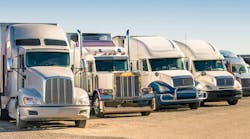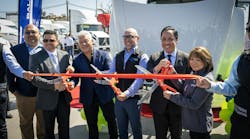Idling regulations used to apply only to the engine a vehicle uses for motive power — THE engine. In California, however, idling restrictions have recently expanded to include other diesel-powered systems that operate while the truck's own engine is turned off, specifically transport refrigeration units or TRUs, for short.
The California Air Resources Board (CARB) defines TRUs as “refrigeration systems powered by diesel internal combustion engines designed to refrigerate or heat perishable products that are transported in various containers, including semi-trailers, truck vans, shipping containers and rail cars. Although they are relatively small…significant numbers of these congregate at distribution centers, truck stops and other facilities, resulting in the potential for health risks to those who live and work nearby.”
To combat the problem, CARB set in-use performance standards for model-year 2002 or older TRU engines, which it began enforcing under the Transport Refrigeration Unit (TRU) Airborne Toxic Control Measure (ATCM) in January. According to a news release, CARB inspectors issued nearly 100 citations for violations of the TRU ATCM in the first part of January alone. The regulations apply to any truck operating in California, regardless of where it is licensed.
FOCUS ON ENFORCEMENT
The Board is “fully committed to fully enforcing all aspects of the TRU ATCM,” CARB notes. “Inspectors are currently inspecting at border crossings, scales, roadside inspection stations, agricultural inspection stations, distribution centers, shippers, delivery points, ports, truckstops, intermodal facilities and any place that TRUs may operate.
“Audits are now being conducted at TRU fleet terminals to ensure in-use standard compliance has been achieved and that ARBER [Air Resources Board Equipment Registration] information is accurate. Any person who knowingly makes a false material statement, representation, or certification in any form or in any report required by the TRU regulation is subject to a fine up to $35,000 per violation.”
For many refrigerated fleets, that has changed their entire business model significantly. “Starting this year, TRUs with engines that are model-year 2002 or older have to be retrofitted with CARB-certified diesel particulate traps or replaced with newer, CARB-certified systems,” says David Kiefer, director of marketing and product management for Carrier Transicold. “The capital requirements could be substantial. We have seen a lot of companies changing out engines and some new unit sales, although some fleets are just redistributing their equipment, moving noncompliant trucks to terminals that do not serve California.”
Kiefer says the new regulations also have had an impact on used-equipment sales. “If you were buying used refrigerated trailers before, all of a sudden you have to think twice about the emissions life left on the equipment,” he explains. “You may think you are taking a used refrigerated trailer that is in excellent shape with lots of useful life left in it, but that may not necessarily be so anymore.”
CARB's TRU life limit is about seven years, regardless of the age and condition of the trailer or container on which it is installed and regardless of the year the engine was manufactured. One of the most frequent questions Carrier Transicold receives, according to the company, is how to tell the model year of a TRU engine.
A NEW ASSET EQUATION
“Each engine has a sticker on it which tells you what the U.S. EPA and CARB considers the emissions model year of that engine to be,” Carrier notes, “and it may or may not be the same as the year the engine was built. For example, you may have a 2007 model-year engine that was manufactured in 2008, or you may have a 2010 model-year engine that was manufactured in 2009. When CARB asks you for the model year of the engine, you need to make sure to look at the sticker on the engine. It has nothing to do with the year the engine was built, the year you purchased the engine (if it was a replacement engine), or the year you put the TRU into service.”
“Equipment emissions are now a part of the fleet asset management equation,” says Olen Hunter, director of sales for PacLease. “It is not just age, mileage and condition that determine vehicle trade cycles anymore. Lots of fleets have extended their trade cycles [because of the recession]. Today, the U.S. fleet is as old as it has ever been and companies are having to take a very hard look at their asset management plan.”
As a result, Hunter sees some fleets moving to leasing rather than owning their equipment. “We are not running into any full-service lease customers who are having compliance problems because we don't let them keep trucks past their useful economic life,” he says.


